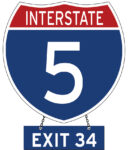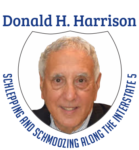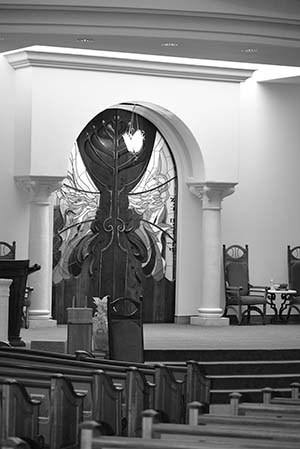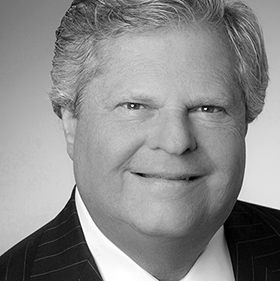 Editor’s Note: This is the 29th Chapter in Volume 2 of Editor Emeritus Donald H. Harrison’s 2022 trilogy, “Schlepping and Schmoozing Along the Interstate 5.” All three books as well as others written by Harrison may be purchased from Amazon.com.
Editor’s Note: This is the 29th Chapter in Volume 2 of Editor Emeritus Donald H. Harrison’s 2022 trilogy, “Schlepping and Schmoozing Along the Interstate 5.” All three books as well as others written by Harrison may be purchased from Amazon.com.
Schlepping and Schmoozing Along the Interstate 5, Exit 34 (Del Mar Heights Road): Jewish National Fund
From the northbound Interstate 5, take the Del Mar Heights Road exit. Turn right (east) and proceed to Congregation Beth Am at 5050 Del Mar Heights Road.
 SAN DIEGO — As a child, Sol Lizerbram dutifully dropped money into the blue pushke that his grandmother Minnie Cutler kept at her home in Philadelphia. She explained to him that the coins would go to the Jewish National Fund, which planted trees in Israel. Likewise, when he was attending Hebrew School, he slid quarters into the slots of a special folder. When all the slots were filled, the folder could be redeemed for a certificate stating that the donation paid for a tree planted in Israel.
SAN DIEGO — As a child, Sol Lizerbram dutifully dropped money into the blue pushke that his grandmother Minnie Cutler kept at her home in Philadelphia. She explained to him that the coins would go to the Jewish National Fund, which planted trees in Israel. Likewise, when he was attending Hebrew School, he slid quarters into the slots of a special folder. When all the slots were filled, the folder could be redeemed for a certificate stating that the donation paid for a tree planted in Israel.
However, the JNF was on the periphery of his life through the time that he graduated from the Philadelphia College of Osteopathic Medicine, trained at several Philadelphia hospitals including one at the University of Pennsylvania, moved with his wife Lauren to San Diego, and, with two partners, started HealthFusion, an electronic medical records business that served doctors throughout the country and eventually went public.

He became a founding member of Congregation Beth Am – which met initially in people’s homes, later moved to quarters in a former Goodyear tire store in Solana Beach, and eventually relocated to its own campus in Carmel Valley, where he and Lauren dedicated the sanctuary named for their family.
The family’s entry into Jewish philanthropy was precipitated by a telephone call Lizerbram received in the early 1980s from M. Larry Lawrence, who was then the owner of the Hotel del Coronado. Lawrence asked him to become involved with the Jewish National Fund.
“I said, ‘What is the Jewish National Fund?’ I knew the Federation, especially being from the East Coast where the Federation is very strong. He explained it to me, and it came back to me, I remembered Bubbe’s blue box. So, he introduced me to the local professional.”
In those days, the Jewish National Fund was a single organization, mainly concerned with planting trees in Israel, but also involved in water conservation. Since that time, it has divided into separate groups with independent boards. The KKL-JNF (Keren Kayemeth Leisrael – Jewish National Fund) is the quasi-governmental organization that owns much of the land in Israel and is responsible for tree planting. JNF-USA is an American group that undertakes various projects and programs for the benefit of Israel’s ecology and citizens.

“The thing that intrigued me about the JNF, which is now called Jewish National Fund-USA, was the fact that you could not only volunteer, but if you donated, you could earmark where your money would go,” Lizerbram told me. “That was very important, as opposed to other organizations, whether Jewish or not” in which money goes to a general fund, to be used at the organization’s discretion.
“At that time, they were also building playgrounds in kibbutzim and moshavim where the kids didn’t have any place to play,” Lizerbram reminisced. Sol and Lauren decided to donate a playground in the Kochav Michael moshav near Ashkelon “where the kids were playing in a rusted-out jeep that was left there from some military battle. We were able to build something that was very modest, but it was still a playground with swings and slides and other components.”
The Lizerbram family went over to Israel to dedicate the playground, bringing their two children, David, then 14, and Marcie, then 10. “It was just a small playground but to that community it was very meaningful,” Lizerbram said, “It was the first project that we could see through from beginning to end.”
Years after the event, Marcie at age 17, wrote an essay for her successful University of Arizona application about how proud she felt when her family dedicated the playground. “It resonated with her,” Lizerbram said. Now both David and Marcie are active in JNF, “so, hopefully, we are starting a generational sequence of involvement,” their father said.
Following that experience, Lizerbram became increasingly active both as a board member of the San Diego chapter of JNF and as a donor to various projects. One was in Halutza, a community that was started by Jews who were removed in 2005 from Gaza after than Prime Minister Ariel Sharon and the Knesset decided that Israel should unilaterally withdraw from that territory. From 12 families, the community built up to hundreds of families. Their farmland has been subjected to attack from Gaza with balloons set on fire and launched when the winds are blowing from the Mediterranean to the east. The burning balloons and kites land in the fields and set the crops ablaze.
“You can’t take a big truck into the middle of a crop field,” Lizerbram said. “You have to take what is called a fire wagon. This is a fire pump that gets attached to a pick-up truck. Then you can zoom out there and put out the fire. Then there are these other vehicles that look like big golf carts, and you can drive out there. So, we have been buying those for the Jewish communities in the Gaza envelope.”
Yet another JNF project that won the hearts of the Lizerbram family is one called “Special in Uniform,” in which youngsters with mental or physical disabilities are given training to help them qualify for service in the Israel Defense Force.
“At the age of 16, almost everyone in Israel gets a letter preparing them for the IDF at the age of 18,” Lizerbram said. However, “if you have a physical or mental challenge – it could be autism or cerebral palsy – you don’t get a letter preparing you for the IDF; you get a letter saying sorry you can’t participate. To these kids and their families, even though they know it is coming, it is a tremendous letdown. Their parents were in the IDF, their brothers and sisters were in the IDF, their grandparents, uncles – everyone – have been in the IDF.”
After Tiran Attia, a reserve lieutenant colonel in the IDF, started the “Special in Uniform” program, JNF-USA decided to heavily sponsor it. “The program takes these individuals and brings them onto an army or air force base, and they train them to do something,” Lizerbram related. “It could be sweeping the floors in the kitchen. Some kids with autism have a phenomenal ability to work with computers. They train them according to their ability and after a period of time they go through an induction ceremony, to actually get inducted into the IDF. They get their beret; they get their ID card. I am telling you if you come to one of these induction ceremonies, bring a lot of Kleenex. There isn’t a dry eye in the place; these kids and their parents are so excited. And, on the army or air force base, they are doing a job that another IDF soldier would be doing. They are freeing that soldier up to do something else, maybe something more critical than sweeping floors. Now it has grown from a couple hundred enrollees to thousands across Israel and is becoming a model for other countries around the world.”
Eventually, Lizerbram’s activities both as a donor and as a member of the local JNF board led to an invitation to serve on the national board. Over the next 20 years, he served under such national JNF presidents as Ron Lauder and Jeffrey Levine, until he was elected as the national organization’s president in October 2017. Normally, presidents serve a pair of two year terms, but because COVID caused many activities to be suspended, Lizerbram’s term was extended beyond the four years.
Under his leadership, in continued partnership with JNF’s chief executive officer, Russell Robinson, the organization has emphasized major projects designed to encourage both tourism and settlement in Israel’s lesser populated Galilee region in the north and the Negev Desert in the south.
For example, in Kiryat Shimona, located near Israel’s border with Lebanon, JNF has been constructing a world-class culinary institute, drawing to its board of directors such famous chefs as Michael Solomonov and Lior Secarz. Solomonov founded the Zahav restaurant in Philadelphia and has been honored as the best chef in the Mid-Atlantic region of the U.S. by the James Beard Foundation. Secarz owns La Boîte, a biscuits and spice shop in New York City, which has been featured in various newspapers and magazines. Both men have written well-received cookbooks.
“Chefs from around the world will be teaching there,” Lizerbram said. The institute will bring jobs and tourists to the area, and that in turn will lead to the building of schools, playgrounds, fire houses, and hospitals, Lizerbram said. “When people take jobs at the culinary institute, they can bring their families. It is very hard to buy a house in Tel Aviv or Jerusalem. But up there, you can get a 3- or 4-bedroom house with a two-car garage, and you can live a different life. Our projects are creating a future, not just a culinary institute.”
A far larger project is underway in Be’er Sheva. In that city in the northern Negev, “We have a $350 million campus” along with a lake and park that are three times the size of Central Park in New York City. “The village will have three main purposes,” Lizerbram said. “First, if you are familiar with the Alexander Muss High School (A JNF-owned Israel high-school-abroad program in Hod Hasharon, Israel), it is expanding tremendously. Students who spend a semester there have increased from 500 to 1,500, and with a second campus in Be’er Sheva, we will have a total of 5,000 students per year.”
“Second, this is a Zionist education campus,” Lizerbram said. “For people who are traveling with synagogues, church groups, Birthright groups, or other groups that want to have a short, intense program regarding Zionism, we will have lecturers from nearby Ben Gurion University of the Negev. It will be a conference center for Israel-related topics.
“Third, we will have the JNF-USA Institute of Technology, with a program for students primarily graduating from universities in the United States who want to do an internship with a Fortune 500 tech company,” Lizerbram continued. “In the U.S. to get an internship at Amazon, Google, or Microsoft – a serious internship – is very difficult. So, I met with Intel and some other Fortune 500 companies that have a presence in a mini-Silicon Valley near Be’er Sheva and proposed the idea of bringing interns from the U.S. and having them spend a year in Be’er Sheva as interns. The response was great. They said they would love to have U.S. interns there.
“We were thinking that they wouldn’t get paid, but these companies said, ‘No, we absolutely want to pay them.’ We are building on campus residences that resemble a Marriott Courtyard, little apartments. The students will be able to participate in the Zionist conferences and discussions while they are on campus. We will have high school students on the same campus with the same sports facilities that college graduates use and with people going to conferences. So, it is going to be an interesting campus with discussions among various groups of people.”
Lizerbram pointed out that a passenger train now connects Be’er Sheva and Tel Aviv, making Israel’s major metropolis accessible to Be’er Sheva residents within an hour’s commute.
In the past, JNF-USA presidents have hailed from the East Coast: Lizerbram was the first to come from the West Coast – similar to the way that San Diegan Gary Jacobs was the first from the West Coast to serve as chairman of the Jewish Community Center Association of North America. Since then, David Wax, a fellow San Diegan, was designated to succeed Jacobs in 2022.
Leaders of their respective national organizations are eligible to sit as members of the Conference of Presidents of Major American Jewish Organizations. The Conference of Presidents (COP) is an umbrella organization that often speaks for American Jews on a variety of issues before the U.S. Congress and the United Nations.
With Lauren, “the first lady of JNF,” Lizerbram attended that organization’s conference in Dubai recently, but generally he finds JNF-USA activities consume most of his time.
Lizerbram sad that of all the money JNF-USA raises, including its multiyear campaign to raise $1 billion, about 18 percent is used for overhead, with the rest going to projects and programs. In comparison, “many nonprofits run 40-50 percent overhead,” he said. JNF-USA’s overhead is lower because “we have so many volunteers who actually take on the job as if they were paid employees,” he explained.
“We have changed the term – we no longer call them ‘lay leaders,’ they are now called ‘ambassadors.’ And we don’t call other people ‘donors,’ we call them ‘partners’ because when you give to JNF-USA you are partnering in a project. Our partners who elevate themselves to ambassadors are contributing not only their money, but their time. The amount of time they spend with the Jewish National Fund is quite extraordinary.”
He said that ambassadors “generally are very successful people – professional business – and they sit on committees that require an extraordinary amount of time. They are in positions to do that; they are at an age and position. You just don’t find that necessarily in other organizations.”
“I am a volunteer as president and I am the same as everyone else,” he commented. “Nobody gets reimbursement for anything. You travel to Israel with task forces or as president I travel there on my own. That is how we are able to contribute so much of the donations to our projects and programs. We take non-Jewish university professors from around the country to Israel every year to let them see what Israel is really like. They go back on their campuses, and when there are issues that come up, they can be advocates for Zionism or Israel.”
Besides the trips to Israel, Lizerbram, in non-COVID years, travels throughout the United States “to attend JNF events such as Tree of Life dinners and breakfast events. It’s remarkable that attendance at these dinners, depending on the city, can range from 1,000 to 2,000. It had been on hold for two years, but it is starting up a little bit,” he told me in January 2022. “There were 700 people registered for an outdoor event in Florida in February 2022. In San Diego we anticipate another 700 people at a brunch. We’re looking at dates now. Maybe in August.”
“It’s a great experience,” Lizerbram reflected. “I consider it to be an honor to be able to be president of such a great organization. To think how it all evolved is interesting – from my grandmother’s blue box to president. I wish she were around to see it. I’m sure she would be very happy to see that I am in this position.”
Glossary:
Be’er Sheva – Place name, Seven Wells
Bubbe – Grandma
Galil – Place name, district or circuit, in northern Israel
Gaza – Place name, strong city
Halutza – Place name, meaning Pioneering settlement
Hod Sharon – Place name, Splendor of the Sharon Plain
Jerusalem – Place name, Rain of Peace
Keren Kayemeth LeIsrael – Jewish National Fund, literally the Israel remainder fund
Kibbutzim – Collective communities without private property
Kiryat Shimona – Place name, Shimona’s planned town
Knesset – Place of Assembly
Kochav Michael – Place name, Star of Michael
La Boîte – French, the box
Moshavim – Collective communities with some private property
Negev Desert – Place name, dry desert
Pushke – Charity box
Tel Aviv – Place name, Hill of Spring
Zahav – Gold
*
Donald H. Harrison is editor emeritus of San Diego Jewish World. He may be contacted via donald.harrison@sdjewishworld.com